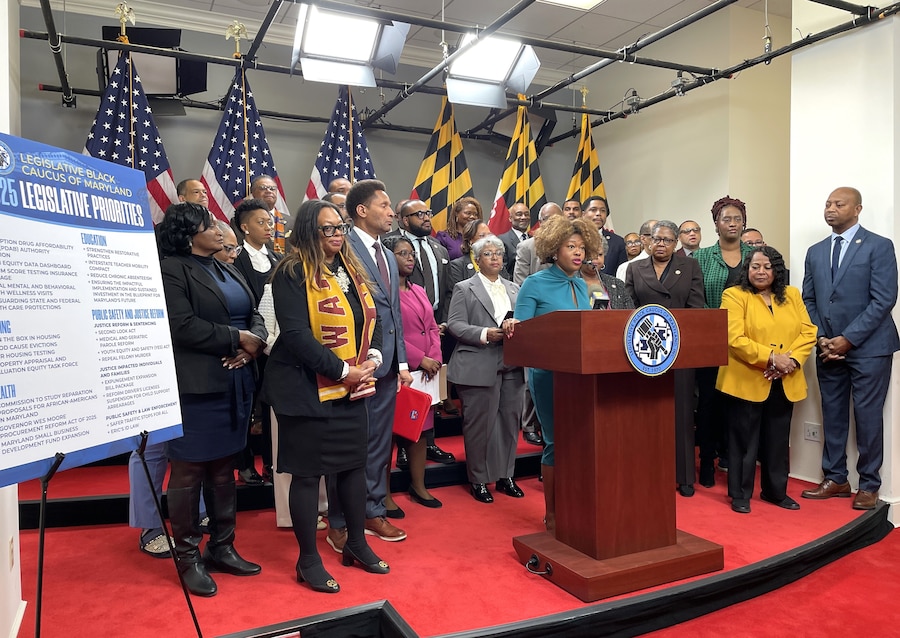
The large and influential Legislative Black Caucus of Maryland is pressing for reforms in Annapolis this year, from studying reparations to ensuring the justice system, public schools and healthcare systems are fair and equitable.
There are so many members of the caucus — more than five dozen — that they struggled to all fit on a small stage to announce their priorities Thursday morning.
“This is a session where we’ll make a lot of tough choices, but we will hold steadfast to our values and stand up for our communities,” said Del. Jheanelle Wilkins, a Montgomery County Democrat and chair of the Black caucus.
While caucus members are no longer fighting racist cross burnings as they did when the caucus was founded in 1970, they’re still fighting for economic and social justice for Black Marylanders, Wilkins said.
The Baltimore Banner thanks its sponsors. Become one.
Caucus members outlined two dozen policy priorities for the current legislative session. They acknowledged that at the same time, they’ll be working to address the state government’s strained fiscal situation.
The caucus already flagged one component of Gov. Wes Moore’s budget proposal — unveiled the day before — that gives them pause: Freezing the amount money going to community schools that serve high-need neighborhoods.
The state’s ambitious multi-year public school improvement program, known as the Blueprint for Maryland’s Future, includes a focus on and funding for community schools. These schools provide additional services to students and their families, such as counseling, medical care and food. Moore proposes to freeze the annual funding for those schools next year, rather than increasing the funding each year as envisioned.
There are hundreds of designated community schools in the state, many in neighborhoods represented by members of the Black caucus, Wilkins said.
“If we’re talking about halting, pausing, cutting funding, we’re talking about cutting those supports to those students and those schools that are most in need,” she said. “That is where our concern lies.”
The Baltimore Banner thanks its sponsors. Become one.
The Black caucus is also supporting a series of bills focused on making the justice system more equitable, from policing to incarceration.
Top of the list is ending the practice of automatically charging juveniles in adult court for certain offenses. A proposal called the YES Act — Youth Equity and Safety Act — has been around in various forms to end the practice completely, or at least for certain charges.
“We are saying ‘yes’ to our children. We are saying, ‘Yes, you are human. Yes, you deserve to at least not automatically be charged as an adult in certain circumstances,’” said Del. Sandy Bartlett, an Anne Arundel County Democrat.
Supporters of the YES Act say that children often end up worse off if they go through adult court and are incarcerated in adult prisons if found guilty.
“This is a public safety bill,” said Sen. William C. Smith Jr., who chairs the Senate Judicial Proceedings Committee. “You’re going to get better public safety outcomes when you get youth the services and the supports that they need so they don’t recidivate.”
The Baltimore Banner thanks its sponsors. Become one.
Smith, a Montgomery County Democrat, said this year’s version of the YES Act likely would cover about 75% of charges that, if the legislation passes, would no longer be charged automatically in adult court.
The Black caucus is supporting a series of bills related to equity in the judicial system. Lawmakers pointed out that Maryland disproportionately incarcerated Black people.
“That is a narrative that cannot exist in a blue state, in a progressive state, in a state with the largest Black caucus in the country,” said Del. Malcolm P. Ruff, a Baltimore Democrat.
Other justice bills the caucus is backing include:
- Studying the circumstances that result in juveniles being charged with felony murder.
- Limiting when police officers can make traffic stops for non-criminal violations like expired registrations.
- Removing the governor’s role in deciding whether to grant medical parole for incarcerated people.
- Improving opportunities for geriatric parole.
- Allowing incarcerated individuals to petition for a sentence reduction after serving at least 20 years, known as the Second Look Act.
- Enabling drivers with “hidden disabilities” to add a marker on their driver’s license that they could show during police interactions.
The Black caucus is also taking on matters of discrimination in housing, health care and economic opportunity.
The Baltimore Banner thanks its sponsors. Become one.
They’re backing plans from Moore to revise how the state awards contracts, in hopes that minority-owned and disadvantaged businesses can better participate.
The caucus also supports measures to ban landlords from asking prospective tenants about criminal history and to improve the home appraisal process that often values homes owned by Black families less than those owned by white families.
And the caucus would like to establish a commission to study the issue of providing reparations, a measure that has failed to gain traction in the legislature in recent years.
“For far too long, our communities have endured the profound consequences of unacknowledged systematic economic exploitation and physical mistreatment,” said Del. Aletheia MacCaskill, a Baltimore County Democrat. “This mistreatment, rooted in the legacy of slavery, segregation and discriminatory practices, has left lasting scars that have yet to be adequately addressed.”


